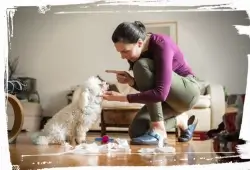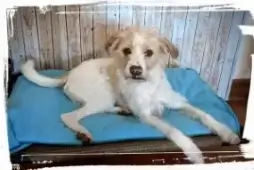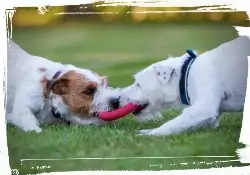Most dog issues are from owners letting their dogs try to figure things out on their own. When a dog enters your home for the first time, they are no longer in a familiar environment. Similar to when children enter a classroom for the first time, they may be anxious or nervous about what to expect. They need to know a few things so they can be comfortable. How do I fit in? What's expected of me? Am I going to be safe? Who is in charge? Can I trust you?
Dogs are constantly assessing everyone. If they see that you don't have control of the environment and everyone in it, you have a recipe for disaster brewing. When you don't provide any leadership and structure (similar to grade school teachers), and don't create and demand polite, respectful behaviors, then you should expect unwanted behaviors from your dogs. Like kids, some dogs adapt quickly, while others need more time. This could be days, weeks, or longer, it all depends on the dog. So don't be in a rush and take as much time as needed.
A common mistake dog owners make is assuming our dogs understand our human world. People can often misread and confuse each other; for example shaking our heads "no" while saying "yes", or having an "active-listening" face that looks a lot like an angry face. Watching a foreign movie without subtitles can be difficult, however we can figure out what's going on because we are the same species.

Now imagine your dog trying to figure us out! When you shake your finger and scold your dog for misbehaving, your dog is clueless and confused about your behavior. When your dog jumps up on you, and you get upset and say "no no, get off" while at the same time petting and giving affection to your dog, it should be no surprise that your dog will become confused and stop listening to you. Without training, there is a lack of clarity for them which can lead to many unwanted behaviors. For example, when you are vacuuming, your dog does not understand that you are cleaning the floor. When the vacuum starts "growling" loudly at you, you keep pushing it away but it keeps coming back at you! You don't look happy with this situation (because who likes to vacuum?), and so your dog becomes concerned. Most dogs become scared and either run away, hiding under the bed, or try to help you by attacking it, barking and/or biting it.
Another example is when we have visitors. When we step back from the door and allow someone to enter our home, it may appear to your dog as if you are allowing this person to take over, causing concern. Visitors tend to stare directly into a dog's eyes, and as they approach your dog, will speak "baby talk". If a stranger stared into your eyes, stood uncomfortably close in your personal space, and then spoke "baby talk" in a foreign language, how would you feel? Would you trust this person?
To help your dog, start by following "grade school" protocols, assigning your dog a "place" to go lay down. An elevated dog bed, like a Coolaroo or Kuranda (sold at
Amazon or
Chewy) works best.
Stay-put is implied; you don't see school teachers saying "stay, staay, staaay" to the kids. If your dog gets up, have him return to his "place" and remain lying down. Repeat as many times as needed for your dog to get the message. If needed, use a tether to help your dog stay-put. For your dog's safety, tethers should not be longer than the width of the dog bed or the length of your dog's topline (withers to tail set). Many overlook the power of confinement protocols. Know that being in "place" is a great way for dogs to learn how to calm themselves, stay-put, and be ok with visitors, children, scary things such as the vacuum, or when recovering from a medical issue.
Crate training also helps prevent unwanted behaviors and ensures all your dogs are safe when unsupervised. Crating your dogs near each other is best as it helps dogs learn to relax near each other. However you have to ensure that all your dogs are practicing good behaviors. If one or more of your dogs are stressed, barking, whining, carrying on, trying to escape, then you're going to have problems. (Imagine living next to the worst neighbor in the world and how it would make you feel.) If you can't ensure good behavior, place a barrier such as pegboard between the crates to block their view, or crate them in different rooms until they are trained. Do not give in to whining and barking to be let out (with the exception of needing to potty) or your dogs will learn to throw tantrums to get what they want. To help your dogs be calm and quiet, you can provide a bone or chew toy to enjoy in their crates.
Before allowing your dogs any off-leash freedom, be sure to teach ALL your dogs to respond reliably to basics using
Science-Based Dog Training: walking politely on a leash, come when called, be polite at thresholds, wait calmly for food, have a rock solid "place" command, stay off furniture (if that's an issue), and be polite around others and their personal space. Even if your new dog is already trained, train again with you as the teacher. Teaching ALL your dogs to be consistently in a relaxed and obedient state of mind will help them learn to coexist and behave around others.
Never let your dogs compete over resources, such as food, toys, bones, and even furniture; this also includes your attention and affection. There can be NO favoritism, no "teacher's pet" as this can create competition resulting in aggression. While you share affection with a dog or person, do not let another dog intrude and become the center of attention or you may create competition for your affection.
Do not give your dogs any attention for being nudgy, demanding, barking or jumping. Correct any unwanted behaviors and reward only polite behaviors.
Never let your dogs work things out for themselves, or you send a message that you won't get involved when there is conflict. If your dogs growl or fight over an object, don't scold them, just remove it. If your dog intimidates another dog or person by staring, interrupt the stare and redirect your dog to another behavior. If your dog steals something, give it back to who originally had it. For some dogs, ALL toys, bones, chew toys, etc should be picked up and put away, don't leave anything out for them to fight over. Remember to also keep crate doors closed to prevent fighting over their "bedrooms". Dogs with a history of aggression should also be trained to stay off of human furniture.
If you don't make time to train your dogs, you will be forced to make time for their behaviors. Be patient! And when you think you've been patient, be patient some more. Taking time to do things right today is so much easier than trying to undo unwanted behaviors later. Of course there are many dogs that you could throw all this out the window, turn them loose instantly and have zero issues. Unfortunately, dog trainers get all the calls for the dogs where it doesn't work out that way.


